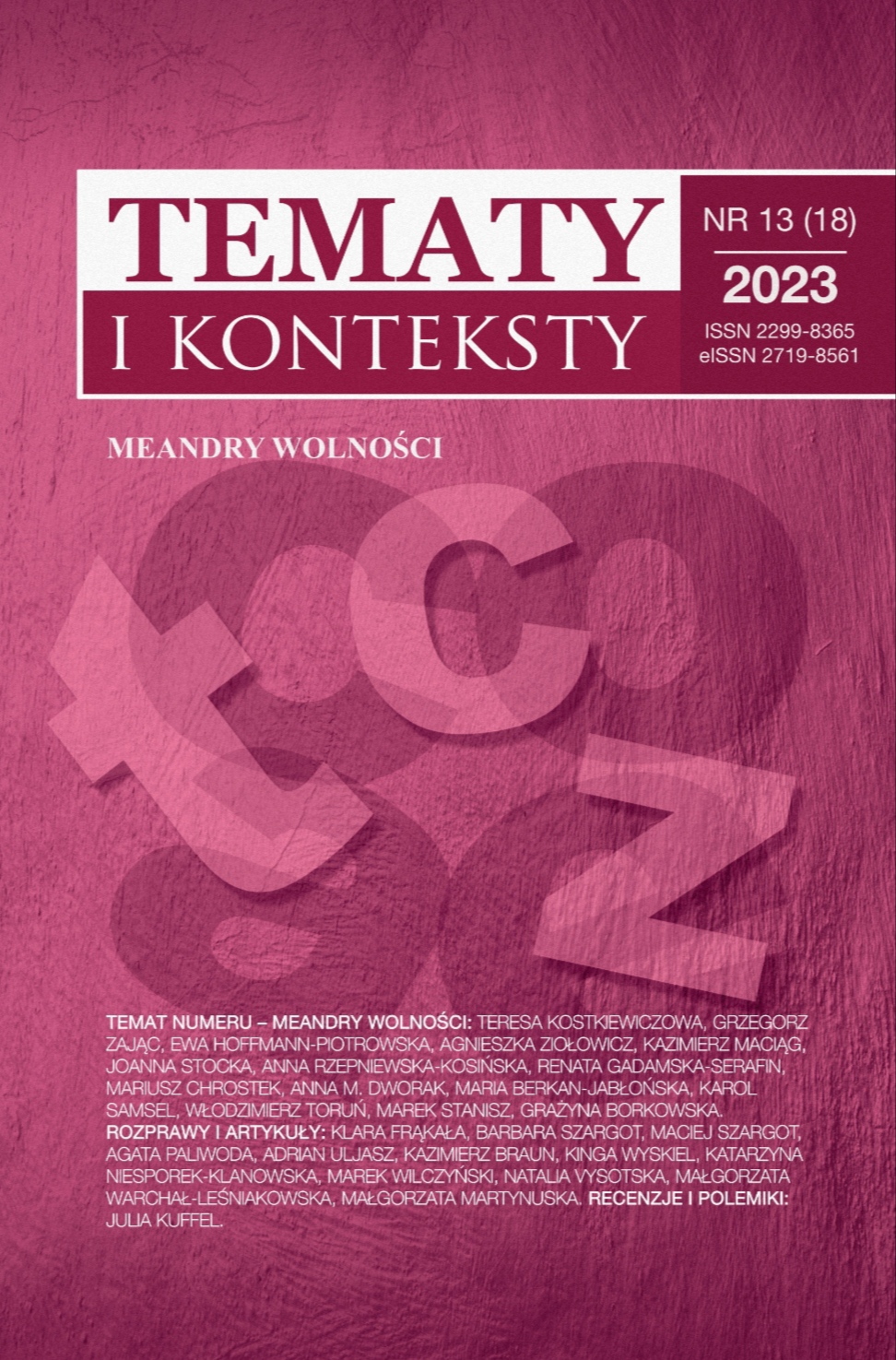“A Soldier’s Life Is a March Through Strikes and Blows.” Traumatic Memories of the Polish Exiles Conscripted into the Caucasian and Orenburg Corps in the First Half of the 19th Century
DOI:
https://doi.org/10.15584/tik.2023.9Keywords:
Polish exiles, conscripted to the tsarist army, beating of exiled soldiers, flogging in the tsarist army, cruelty in the Russian army in the 19th century, the Caucasian Corps, the Orenburg CorpsAbstract
Penal service in the Russian army – apart from exile to Siberia – was one of the main forms of repression used against Poles convicted of political crimes under the Russian rule in the first half of the 19th century. Over time, officers could apply for dismissal, but the living conditions of ordinary soldiers was appalling, as evidenced by the diaries and letters of exiles conscripted into the Caucasian Corps (including Mateusz Gralewski, Zygmunt Rewkowski, Franciszek Sawicz, Hipolit Jaworski, Władysław Jurkowski) and the Orenburg Corps (including Adolf Jabłoński, Bronisław Zaleski, Maksymilian Jatowt, Walerian Staniszewski), as well as Agaton Giller serving in eastern Siberia. They travelled on foot thousands of kilometers to the place of exile, often in shackles and chains, hungry, marching regardless of severe frosts, unbearable heat and torrential rains, frequently in the mountains. They spent their nights in old, wooden, ruined barracks that lacked air and were full of vermin. They slept on bunk beds or on the ground, among excrement, which caused epidemics and deaths. The tragic fate of the Polish soldiers also resulted from the obligation to participate in the imperial conquests of the tsar’s army – together with the Russians, they had to attack and murder the peoples of the Caucasus, today’s Kazakhstan, and western Siberia, who were defending their freedom. Every day they lived in cramped dugouts, where they slept on the ground on dirty pallets, wearing uniforms and shoes, and were themselves often covered with filth. Those simple soldiers were constantly beaten and humiliated physically and mentally. They are beating with fists whenever commanders were in such a mood. The most cruel was public flogging where soldiers were beaten with sticks, batons, rods, quirts and whips. The punishment ranged from several hundred to several thousand strokes, which often resulted in the victim’s agony and death. Flogging was used even for minor or alleged offenses. The widespread cruelty promoted sadism among the commanders, and demoralization spread (drunkenness, gambling, brothels). Privates also succumbed to it. The soldiers were afraid of getting ill because in hospitals they were beaten, robbed of food, and prescribed inappropriate medicines by unqualified staff. The mortality rate in the Russian army was very high – only a few Poles managed to return to their homeland.
Downloads
References
Listy Władysława Jurkowskiego, Biblioteka Kórnicka PAN, rkps, sygn. 1163, k. 21.
Giedroyć W. G., Kilka wspomnień z kaukaskiego wygnania, Lwów 1867.
Giller A., Opisanie Zabajkalskiej Krainy w Syberii, t. 1–3, Lipsk 1867.
Gordon J. [Maksymilian Jatowt], Obrazki caryzmu. Pamiętniki..., Lipsk 1861–1863.
Gralewski M., Kaukaz. Wspomnienia z dwunastoletniej niewoli, oprac. merytorycznie oraz opatrzył komentarzami P. Adamski, Poznań 2015.
Jasieńczyk J. [Adolf Jabłoński], Dziesięć lat niewoli moskiewskiej, Lipsk 1867.
Jaworski H., Wspomnienia Kaukazu, cz. 1–3, Poznań 1877.
Pilat S., Ustęp z pamiętników Stanisława Pilata z czasu jego niewoli na Kaukazie, w: Album lwowskie, Lwów 1862, s. 123–149.
Rewkowski Z., Pamiętniki, t. 1: Wilno. Ostatnie lata Uniwersytetu, t. 2: Zesłanie. W sołdaty na Kaukaz. Na prawach rękopisu. Z oryginału do druku przygotował, wstępem i przypisami opatrzył W. Więsław, Wrocław 2011.
Sawicz F., Więźnia i wygnańca Sawicza pamiętnik, w: E. Heleniusz [E. Iwanowski], Wspomnienia lat minionych, t. 2, Kraków 1876, s. 187–229.
Staniszewski W., Pamiętniki więźnia stanu i zesłańca, oprac. A. Gałkowski, W. Śliwowska, Warszawa 1994.
Wolicki K., Wspomnienia z pobytu w Cytadeli warszawskiej i na Syberii, Lwów 1876.
Zaleski B., Wygnańcy polscy w Orenburgu, „Rocznik Towarzystwa Historyczno-Literackiego w Paryżu” 1866, s. 75–107.
Baranowscy B. i K., Polaków kaukaskie drogi, Łódź 1985.
Brus A., Kaczyńska E., Śliwowska W., Zesłanie i katorga na Syberii w dziejach Polaków 1815–1914, Warszawa 1992.
Caban W., Służba rekrutów z Królestwa Polskiego w armii carskiej w latach 1831–1873, Warszawa 2001.
Chrostek M., Romantyczny wizerunek zesłańca i jego miejsce w literaturze dziewiętnastowiecznej, w: Literatura i jej konteksty. Prace ofiarowane profesorowi Czesławowi Kłakowi, Rzeszów 2005, s. 184–207.
Janik M., Dzieje Polaków na Syberii, Kraków 1928.
Janion M., Żmigrodzka M., Romantyzm i historia, Warszawa 1978.
Kaczyńska E., Ludzie ukarani. Więzienia i system kar w Królestwie Polskim 1815–1914, Warszawa 1989.
Kaczyńska E., Syberia: największe więzienie świata (1815–1914), Warszawa 1991.
„Minuwszyje Gody” 1908, nr 10, s. 116.
Sapargalijew G., Djakow W., Polacy w Kazachstanie w XIX w., Warszawa 1982.
Śliwowska W., Polscy zesłańcy polityczni na Syberii w pierwszej połowie XIX wieku. Mity i rzeczywistość, „Przegląd Wschodni” 1991, t. 1, z. 2, s. 239–266.
Śliwowska W., Zesłańcy polscy w Imperium Rosyjskim w pierwszej połowie XIX wieku. Słownik biograficzny, Warszawa 1998.
Wieliczko M.J., Jeniectwo wojenne Polaków w Rosji w latach 1503–1918: określenie problemu, Lublin 1998.
Downloads
Published
How to Cite
Issue
Section
Categories
License
Copyright (c) 2023 Tematy i Konteksty

This work is licensed under a Creative Commons Attribution-NonCommercial-NoDerivatives 4.0 International License.




